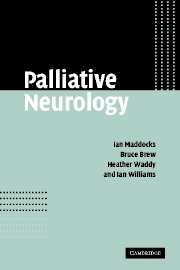Book contents
- Frontmatter
- Contents
- Foreword
- Note on drugs and abbreviations
- Section I Palliative Management
- Section II Major discomforts in advanced neurological illness
- Section III Major neurological conditions requiring palliation
- Section IV Ethical issues
- 1 Consent and decision-making
- 2 Advance directives
- 3 Proxy decision-making
- 4 Ethical issues in states of disordered consciousness
- 5 Terminal sedation
- 6 Euthanasia
- Section V Appendices
- Index
6 - Euthanasia
from Section IV - Ethical issues
Published online by Cambridge University Press: 08 January 2010
- Frontmatter
- Contents
- Foreword
- Note on drugs and abbreviations
- Section I Palliative Management
- Section II Major discomforts in advanced neurological illness
- Section III Major neurological conditions requiring palliation
- Section IV Ethical issues
- 1 Consent and decision-making
- 2 Advance directives
- 3 Proxy decision-making
- 4 Ethical issues in states of disordered consciousness
- 5 Terminal sedation
- 6 Euthanasia
- Section V Appendices
- Index
Summary
There can be no doubt that the terminal phase of many neurological diseases may involve serious suffering (physical, emotional and spiritual). Although such situations are often endured with exemplary courage and patience, they also inevitably raise questions of the value of continued life in the face of persistent suffering, or permanent incapacity for effective cognition or movement. Is a hastening of the process of dying to be preferred? A hierarchy of options for hastening death to relieve severe suffering may be listed. Some are more acceptable to public opinion than others; some are more readily countenanced by established medical ethics; some are advocated widely but allowed in very few countries.
(a) Allowing the patient to refuse all food and drink. A conscious patient in most jurisdictions is permitted to refuse treatment, and in some places may also be permitted to refuse nutrition, and be assisted to remain comfortable through a period of terminal decline (often referred to as ‘starvation’, but this is an emotive term, better kept for an imposed restriction of food rather than one which is self-chosen). A demented patient may be difficult to feed, clamping the mouth shut, turning the head away. Some clinicians suggest that such individuals should not be forced to receive nutrition (e.g. with a nasogastric tube) but permitted to refrain from food and drink as they seem to wish. In other situations, however, this is expressly forbidden (either by established medical ethic or by law) and physicians are required to maintain nutrition in some way.
…
- Type
- Chapter
- Information
- Palliative Neurology , pp. 219 - 222Publisher: Cambridge University PressPrint publication year: 2005



